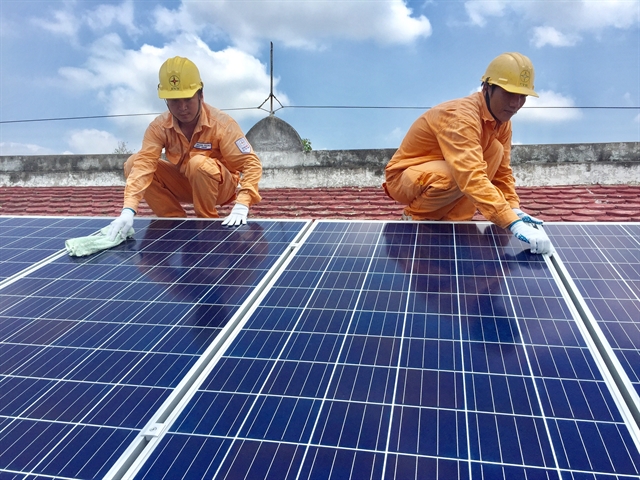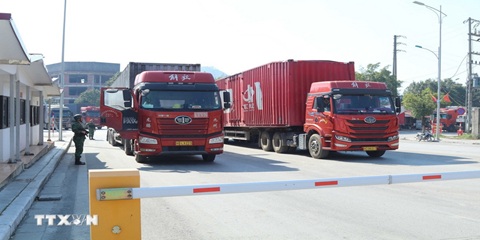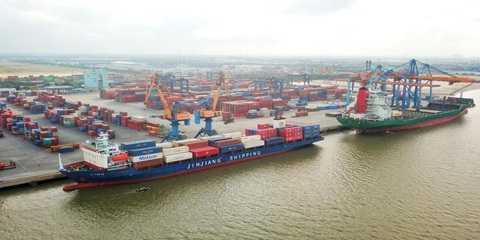Want to be in the loop?
subscribe to
our notification
Business News
VIỆT NAM’S SOLAR EXPORTS HIT WITH US DUTIES OF UP TO 542.6 PER CENT
Solar cell and panel imports to the US from Việt Nam will face countervailing duties of up to 542.6 per cent.

Electrical workers clean solar panels on household rooftops in Tây Ninh Province. — VNA/VNS Photo Thanh Tân
HÀ NỘI — The US has officially imposed steep tariffs on solar energy products imported from four Southeast Asian countries, including Việt Nam, Malaysia, Thailand and Cambodia.
The tariffs unveiled on Apr 21 vary widely depending on the company and country, but were broadly higher than the preliminary duties announced late last year.
According to the US Department of Commerce, solar cell and panel imports will face varying countervailing duties — as high as 3,403.9 per cent for Cambodia, 799.5 per cent for Thailand, 542.6 per cent for Việt Nam, and 168.8 per cent for Malaysia.
These countries accounted for 77 per cent of US solar panel imports in 2024, according to Bloomberg NEF.
The move delivers a heavy blow to the region’s renewable energy manufacturing sector, with Việt Nam among the hardest hit.
It follows a year-long trade investigation initiated at the request of US solar manufacturers after a complaint that Chinese companies operating in Southeast Asia were allegedly dumping products and benefitting from unfair government subsidies, distorting the market.
The case was brought by Korea's Hanwha Qcells, Arizona-based First Solar Inc and several smaller producers seeking to protect billions of dollars in investments in US solar manufacturing.
Industry insiders consider the new tariff alarming, representing a major shock to Việt Nam’s green energy export industry.
The US has been one of Việt Nam’s largest markets for solar equipment. The new tariffs will increase costs and risk, causing Vietnamese manufacturers to lose market share in the US.
Renewable energy companies are under immense pressure, and without swift adaptation, the loss of the US market and revenue shortfalls in the near future are highly likely.
It is urgent for Việt Nam to pivot quickly, expanding into new markets including Europe, Japan and Australia, while enhancing competitiveness and adhering more strictly to international standards to overcome the growing wave of trade barriers.
In order for the tariffs to be finalised, the US International Trade Commission (ITC) is expected to vote in June based on its assessment of the actual damage to the US domestic solar manufacturing sector. — BIZHUB/VNS
Source: VNS
Related News

VIETNAM’S SEAFOOD EXPORTS HIT OVER US$10 BILLION IN JAN-NOV
Seafood export revenue in November alone amounted to nearly US$990 million, up 6.6% year-on-year. Key product groups posted solid gains. Shrimp exports rose 11.7% to over US$385 million, supported by strong demand for whiteleg shrimp and lobster. Tra fish shipments increased 9.7% to almost US$197 million, while marine fish, squid, and mollusk exports maintained their recovery.

VIETNAM’S AGRO-FORESTRY-FISHERY EXPORTS HIT NEW RECORD IN JAN-NOV
Vietnam’s agro-forestry-fishery export revenue reached an estimated US$64.01 billion in the first 11 months of 2025, up 12.6% year-on-year and surpassing the full-year record of US$62.4 billion set in 2024. Agricultural exports reached US$34.24 billion, up 15% year-on-year, while livestock products brought in US$567.4 million, a 16.8% increase. Seafood exports rose 13.2% to US$10.38 billion, and forestry products earned US$16.61 billion, up 5.9%.

HANOI REPORTS RECORD-HIGH BUDGET REVENUE IN 2025
Hanoi’s budget revenue is estimated to reach VND641.7 trillion in 2025, the highest level ever recorded and nearly 25% above the revised target, according to a report by the municipal government. Data from the city’s socioeconomic performance review shows that total state budget collections in 2025 are projected to reach 124.9% of the adjusted plan and rise 24.9% from 2024, the Vietnam News Agency reported.

VIETNAM, CHINA TO PILOT TWO-WAY CARGO TRANSPORT AT LANG SON BORDER
Vietnam and China will launch a one-year pilot program on December 10 to allow two-way cargo transport through the Huu Nghi–Youyi Guan international border gates in Lang Son Province, reported the Vietnam News Agency. The Dong Dang-Lang Son Economic Zone Management Board said the trial aims to reduce transport costs and improve customs clearance capacity.

VIETNAM’S IMPORT-EXPORT VALUE NEARS US$840 BILLION IN JAN-NOV
The total value of Vietnam’s imports and exports was nearly US$840 billion between January and November this year, the highest level ever recorded, according to the National Statistics Office. In its latest report on the country’s socio-economic performance, the National Statistics Office highlighted a series of positive economic indicators, with trade emerging as one of the strongest drivers of growth.

OVER 19 MILLION INTERNATIONAL VISITORS COME TO VIETNAM IN JAN-NOV
Vietnam received more than 19.1 million international visitors in the first 11 months of 2025, a 20.9% increase year-on-year and the highest level ever recorded, according to the National Statistics Office. The figure surpasses the full-year record of 18 million arrivals set in 2019, before the Covid-19 pandemic. Nearly two million foreign visitors arrived in November alone, up 14.2% from October and 15.6% from the same period last year.
























